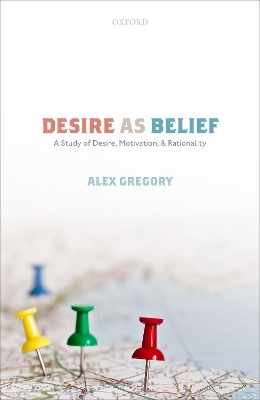
Desire as Belief
A Study of Desire, Motivation, and Rationality
Seiten
2021
Oxford University Press (Verlag)
978-0-19-884817-2 (ISBN)
Oxford University Press (Verlag)
978-0-19-884817-2 (ISBN)
What is a desire? Our wants must often compete with our beliefs about what we ought to do. This book defends "desire as belief", a view in which desires are a special subset of our normative beliefs, and in which we can accept orthodox models of human motivation while also making room for normative beliefs to play a role in our decision-making.
A popular model of human action treats it as universally explicable by appeal to what we want. A related view evaluates our actions as rational or otherwise by appeal to what we want. However, these dominant views sit in tension with two other common sense ideas. First, that our normative beliefs — such as our beliefs about what we ought to do — sometimes explain our actions. Second, that those beliefs are crucial for determining whether our actions are rational. To try and resolve these tensions, this book defends 'desire-as-belief', the view that desires are just a special subset of our normative beliefs. This view entitles us to accept orthodox models of human motivation and rationality that explain those things with reference to desire, while also making room for our normative beliefs to play a role in those domains. This view also tells us to diverge from the orthodox view on which desires themselves can never be right or wrong. Rather, according to desire-as-belief, our desires can themselves be assessed for their accuracy, and they are wrong when they misrepresent normative features of the world. Hume says that it is not contrary to reason to prefer the destruction of the whole world to the scratching of your finger, but he is wrong: it is foolish to have this preference, and this is so because this preference misrepresents the relative worth of these things. This book mounts an engaging and comprehensive defence of these ideas.
A popular model of human action treats it as universally explicable by appeal to what we want. A related view evaluates our actions as rational or otherwise by appeal to what we want. However, these dominant views sit in tension with two other common sense ideas. First, that our normative beliefs — such as our beliefs about what we ought to do — sometimes explain our actions. Second, that those beliefs are crucial for determining whether our actions are rational. To try and resolve these tensions, this book defends 'desire-as-belief', the view that desires are just a special subset of our normative beliefs. This view entitles us to accept orthodox models of human motivation and rationality that explain those things with reference to desire, while also making room for our normative beliefs to play a role in those domains. This view also tells us to diverge from the orthodox view on which desires themselves can never be right or wrong. Rather, according to desire-as-belief, our desires can themselves be assessed for their accuracy, and they are wrong when they misrepresent normative features of the world. Hume says that it is not contrary to reason to prefer the destruction of the whole world to the scratching of your finger, but he is wrong: it is foolish to have this preference, and this is so because this preference misrepresents the relative worth of these things. This book mounts an engaging and comprehensive defence of these ideas.
Alex Gregory is Lecturer in Philosophy at the University of Southampton. He has published most frequently on the nature of desire, but also on other issues such as the nature of normative reasons, the nature of disability, and questions about wellbeing.
Introduction
1: What is Desire-as-Belief?
2: Desire and Motivation
3: Normative Belief and Motivation
4: Desire and Rationality
5: Irrationality
6: The Guise of the Normative
7: Desire and Feeling
8: Uncertainty and Reasoning
9: Representing Reasons
10: Desires and Reasons
11: Conclusion
Appendix A: Lewis on Desire-as-Belief
| Erscheinungsdatum | 01.09.2021 |
|---|---|
| Verlagsort | Oxford |
| Sprache | englisch |
| Maße | 160 x 241 mm |
| Gewicht | 498 g |
| Themenwelt | Geisteswissenschaften ► Philosophie ► Ethik |
| ISBN-10 | 0-19-884817-X / 019884817X |
| ISBN-13 | 978-0-19-884817-2 / 9780198848172 |
| Zustand | Neuware |
| Informationen gemäß Produktsicherheitsverordnung (GPSR) | |
| Haben Sie eine Frage zum Produkt? |
Mehr entdecken
aus dem Bereich
aus dem Bereich


